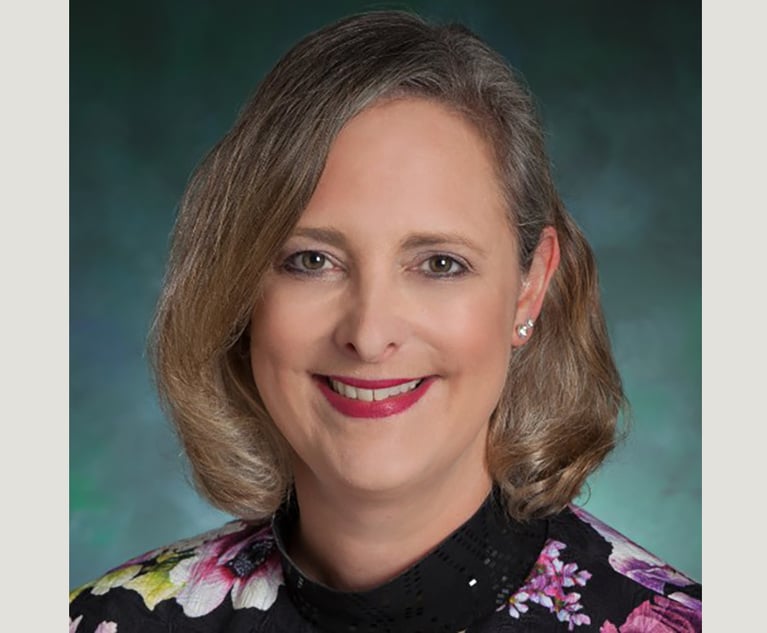Crisis prevention and management: Global GCs step forward
For those of us who have championed the idea of general counsel as global business strategists, KPMG's most recent study is a welcome validator of the essential points weve emphasized.
July 23, 2014 at 08:00 PM
4 minute read
For those of us who have championed the idea of “general counsel as global business strategists,” KPMG's most recent study is a welcome validator of the essential points we've emphasized.
“Over the Horizon: General Counsel Report 2014” follows up on KPMG's pioneering 2012 study “Beyond the Law,” which assessed the extent to which GCs are now business strategists, particularly as they're positioned vis-à-vis corporate boards. For a communications professional, the report has additional value in its emphasis on risk management and crisis prevention, including rich anecdotal evidence and attributed comments by top in-house lawyers.
The study cites Kenneth Frazier, Merck's GC during the Vioxx turmoil and its current CEO. Frazier's handling of those reputational and legal issues must have been decisive to his promotion. “Never waste a crisis,” as the report reminds its readers.
The absence of crises likewise offers potent career-building opportunities provided in-house lawyers can underscore their own preventive roles. Effective prophylaxis highlights their contributions to profitability and bottom-line results. When clients don't need to manage crises, GCs then get “more kudos for innovating, for understanding our customers and competitors,” says Roberto Putland, Hewlett-Packard's legal affairs director.
Now we see in-house counsel involved to a greater extent in the internal mechanisms designed for preventive impact. At Cemex, GC Ramiro Villarreal is secretary of both the audit and corporate practice committees and is a member of the risk management committee.
At GTI Group, GC Dan Fitz works closely on the company's group risk register, overseeing the top 12 risk areas plus those risks “bubbling under,” related to individual business lines. Fitz has played a key role formulating GTI's crisis management plan while participating in-group role-play exercises.
As might be expected, regulatory is still the area providing GCs the most compelling opportunity to show leadership. It's their substantive bailiwick, and the one area where their predictive instincts can have the most telling business impact.
At RBS, deputy head of operational risk management Richard Collins says they regularly scan to see where regulators will focus next. Now it's consumer banking, especially as regulations get transferred from one jurisdiction to another.
Yet if regulatory is the most obvious area where in-house counsel make their predictive bones, 60 percent of KPMG's respondents agree it's also their greatest challenge. As Melanie Rowlands, deputy to the GC at Smiths Group PLC, advises, regulators “are under pressure to be seen to be effective,” and are therefore “less predictable than ever.” We're back in the Court of Public Opinion where regulators are susceptible to the passing political fancies of elected officials to whom they ultimately answer.
Nowhere is that public tribunal more demanding than in the area of cybersecurity, as nowhere else is the public more decisively affected. It's interesting to read the comment by Airbus Group GC Peter Kleinschmidt in “Over the Horizon” that it's not a question for the legal officer. “Ask the chief technical officer,” says Kleinschmidt; the issue is “inaccessible to legal remedies.”
Is such a perspective now anomalous or indicative of a persistent silo-like mentality? Comments to KPMG from Merck, Sanofi and Cemex suggest the former, and are confirmation that the human error or wrongdoing causing these disasters is a public as well as legal problem. Even the technological fault lines—like excessive downloading or, as Villarreal points out, the danger when employees create their own back-up files—are human issues requiring the input of all business strategists.
Cybersecurity involves much more than technology, maintains Stephen Bonner, KPMG's head of cyber for financial services, who says GCs must be at the table. They must advise on the legal impact of breaches, on how to communicate to stakeholders, what steps to take and how to respond if the perps get caught.
For legal, “it's all about what you can do, not what you can't,” says Bonner.
This content has been archived. It is available through our partners, LexisNexis® and Bloomberg Law.
To view this content, please continue to their sites.
Not a Lexis Subscriber?
Subscribe Now
Not a Bloomberg Law Subscriber?
Subscribe Now
NOT FOR REPRINT
© 2025 ALM Global, LLC, All Rights Reserved. Request academic re-use from www.copyright.com. All other uses, submit a request to [email protected]. For more information visit Asset & Logo Licensing.
You Might Like
View All
Global Software Firm Trying to Jump-Start Growth Hands CLO Post to 3-Time Legal Chief

In-House Legal Network The L Suite Acquires Legal E-Learning Platform Luminate+

Antitrust in Trump 2.0: Expect Gap Filling from State Attorneys General
6 minute readTrending Stories
- 1Day Pitney Announces Partner Elevations
- 2The New Rules of AI: Part 2—Designing and Implementing Governance Programs
- 3Plaintiffs Attorneys Awarded $113K on $1 Judgment in Noise Ordinance Dispute
- 4As Litigation Finance Industry Matures, Links With Insurance Tighten
- 5The Gold Standard: Remembering Judge Jeffrey Alker Meyer
Who Got The Work
J. Brugh Lower of Gibbons has entered an appearance for industrial equipment supplier Devco Corporation in a pending trademark infringement lawsuit. The suit, accusing the defendant of selling knock-off Graco products, was filed Dec. 18 in New Jersey District Court by Rivkin Radler on behalf of Graco Inc. and Graco Minnesota. The case, assigned to U.S. District Judge Zahid N. Quraishi, is 3:24-cv-11294, Graco Inc. et al v. Devco Corporation.
Who Got The Work
Rebecca Maller-Stein and Kent A. Yalowitz of Arnold & Porter Kaye Scholer have entered their appearances for Hanaco Venture Capital and its executives, Lior Prosor and David Frankel, in a pending securities lawsuit. The action, filed on Dec. 24 in New York Southern District Court by Zell, Aron & Co. on behalf of Goldeneye Advisors, accuses the defendants of negligently and fraudulently managing the plaintiff's $1 million investment. The case, assigned to U.S. District Judge Vernon S. Broderick, is 1:24-cv-09918, Goldeneye Advisors, LLC v. Hanaco Venture Capital, Ltd. et al.
Who Got The Work
Attorneys from A&O Shearman has stepped in as defense counsel for Toronto-Dominion Bank and other defendants in a pending securities class action. The suit, filed Dec. 11 in New York Southern District Court by Bleichmar Fonti & Auld, accuses the defendants of concealing the bank's 'pervasive' deficiencies in regards to its compliance with the Bank Secrecy Act and the quality of its anti-money laundering controls. The case, assigned to U.S. District Judge Arun Subramanian, is 1:24-cv-09445, Gonzalez v. The Toronto-Dominion Bank et al.
Who Got The Work
Crown Castle International, a Pennsylvania company providing shared communications infrastructure, has turned to Luke D. Wolf of Gordon Rees Scully Mansukhani to fend off a pending breach-of-contract lawsuit. The court action, filed Nov. 25 in Michigan Eastern District Court by Hooper Hathaway PC on behalf of The Town Residences LLC, accuses Crown Castle of failing to transfer approximately $30,000 in utility payments from T-Mobile in breach of a roof-top lease and assignment agreement. The case, assigned to U.S. District Judge Susan K. Declercq, is 2:24-cv-13131, The Town Residences LLC v. T-Mobile US, Inc. et al.
Who Got The Work
Wilfred P. Coronato and Daniel M. Schwartz of McCarter & English have stepped in as defense counsel to Electrolux Home Products Inc. in a pending product liability lawsuit. The court action, filed Nov. 26 in New York Eastern District Court by Poulos Lopiccolo PC and Nagel Rice LLP on behalf of David Stern, alleges that the defendant's refrigerators’ drawers and shelving repeatedly break and fall apart within months after purchase. The case, assigned to U.S. District Judge Joan M. Azrack, is 2:24-cv-08204, Stern v. Electrolux Home Products, Inc.
Featured Firms
Law Offices of Gary Martin Hays & Associates, P.C.
(470) 294-1674
Law Offices of Mark E. Salomone
(857) 444-6468
Smith & Hassler
(713) 739-1250







